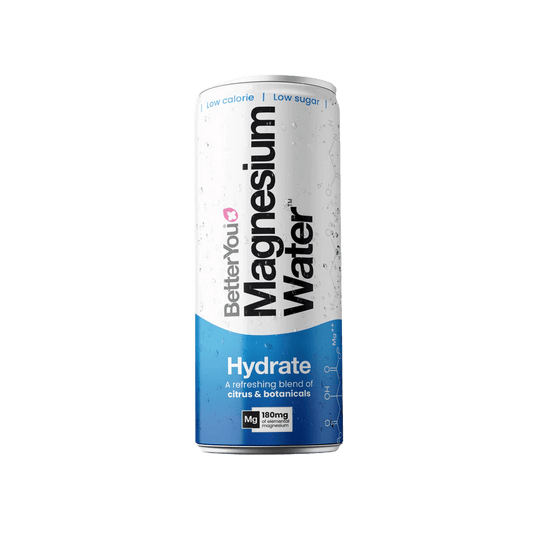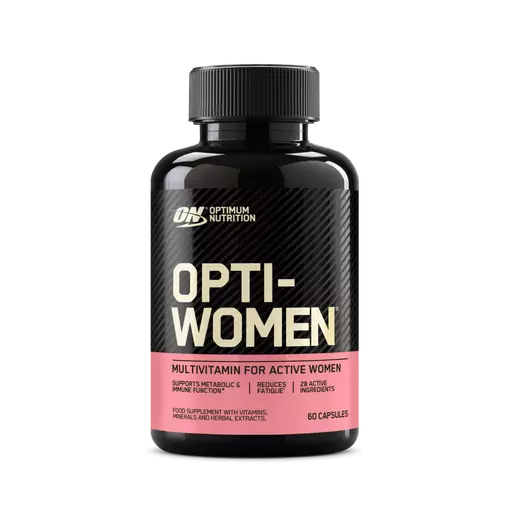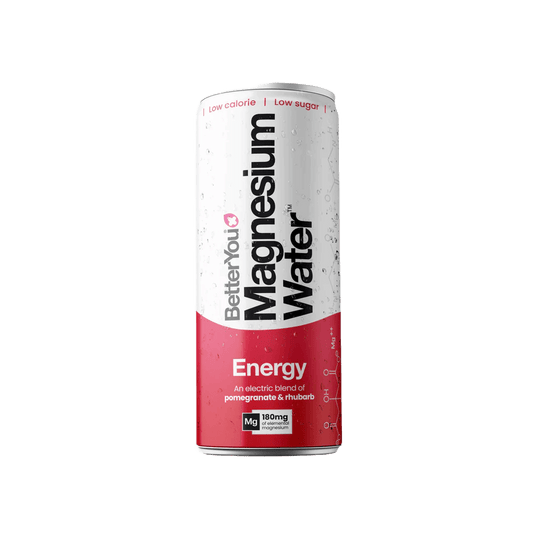Introduction: Why Magnesium Is Having a Moment
If protein shakes and creatine are the stars of the gym recovery world, magnesium is the underdog quietly climbing the ranks. For years, this essential mineral was overlooked — considered something you’d get “enough of” from food. But more and more athletes, gym‑goers, and health‑conscious people in their 30s are realising they may be missing out.
The question is simple: does magnesium really help with sleep and muscle recovery, or is it just another overhyped supplement? Let’s dig into the science, the symptoms of deficiency, and why products like BetterYou Magnesium Waters are gaining attention in the UK.

How Long Does It Take for Magnesium to Work for Sleep?
If you’ve ever struggled to fall asleep after a late gym session, you’re not alone. Elevated cortisol, muscle soreness, and even small deficiencies in magnesium can all interfere with deep, restorative sleep.
The good news? Magnesium doesn’t take months to show effects. Many people notice improvements within a few nights to a week when using magnesium consistently before bed.
-
First few days: Calmer evenings, easier transition to sleep.
-
After 1–2 weeks: Reduced nighttime wake‑ups, deeper sleep cycles.
-
After a month: Noticeable improvements in energy levels, recovery, and mood.
Products like BetterYou Magnesium Waters make this even easier — you get a hydrating drink that delivers magnesium in an easily absorbable form, perfect before bed.
Does Magnesium Help With Sleep and Muscle Recovery?
The short answer: absolutely. Magnesium plays a role in over 300 biochemical processes in the body, and two of the most important for gym‑goers are sleep quality and muscle recovery.
Here’s how it works:
-
Muscle relaxation: Magnesium helps regulate calcium in the muscles, preventing cramping and reducing tension after workouts.
-
Nervous system support: It promotes the release of GABA, a neurotransmitter that calms the brain and prepares you for sleep.
-
Reduced cortisol: Magnesium, especially when paired with Applied Nutrition Ashwagandha, supports lower stress hormones, which improves both sleep quality and recovery.
-
Protein synthesis: Adequate magnesium is needed for muscle protein synthesis — the process your body uses to build new muscle.
It’s no wonder athletes and active adults increasingly list magnesium as one of the best supplements for gym recovery.
What Type of Magnesium Is Best for Sleep?
Magnesium isn’t one‑size‑fits‑all. Different forms target different functions.
-
Magnesium glycinate: Known for calming effects and reducing stress.
-
Magnesium citrate: Absorbs well but may have a mild laxative effect.
-
Magnesium malate: Often used for energy and reducing fatigue.
-
Topical magnesium / magnesium water: Quick absorption, gentle on digestion, and convenient.
That’s why BetterYou Magnesium Waters stand out in the UK market. They provide a practical, easily absorbed option without the digestive issues sometimes linked with tablets. For women and men balancing gym training, work, and recovery, they’re an ideal choice.
Does Magnesium Actually Work?
Skepticism is healthy — supplements should earn their place in your routine. Luckily, magnesium has the research to back it up.
-
Studies show magnesium supplementation improves sleep onset, duration, and quality, especially in people with lower baseline levels.
-
Athletes report reduced delayed onset muscle soreness (DOMS) and better recovery times with consistent magnesium use.
-
Magnesium deficiency symptoms UK — like muscle cramps, poor sleep, and low energy — are surprisingly common in adults who train hard.
And because diet alone often doesn’t cut it (intense exercise increases magnesium loss through sweat), supplementation can make a measurable difference.
Is There a Downside to Taking Magnesium?
For most people, magnesium is one of the safest supplements available. However, there are a few things to consider:
-
Mild digestive issues (such as loose stools) can occur with certain forms like magnesium citrate at high doses.
-
Too much magnesium from supplements may cause discomfort, but it’s extremely rare unless intake is excessive.
-
Always follow the recommended daily dosage — more isn’t better.
With drinks like BetterYou Magnesium Waters, the risk of overdoing it is low, and the form is gentle and easy to absorb.
Pairing magnesium with Supplement Needs Omega 3 (to fight inflammation) and Reflex Clear Whey Isolate (for muscle repair) creates a complete recovery toolkit.
Recap of Part 1
We’ve covered the basics:
-
Magnesium can start improving sleep within the first week.
-
It supports both muscle relaxation and deep, restorative sleep.
-
BetterYou Magnesium Waters are a standout option in the UK thanks to easy absorption.
-
Most people benefit without downsides, especially when using balanced forms.
👉 Coming in Part 2:
-
Can magnesium reduce DOMS?
- How much magnesium do athletes need daily?
- Stacking magnesium with ashwagandha and omega‑3
- When should you drink magnesium water?
-
FAQ’s
Does Magnesium Really Help With Sleep and Muscle Recovery? (Part 2)

Can Magnesium Reduce DOMS?
Delayed onset muscle soreness (DOMS) is a rite of passage after tough training sessions, especially if you’re lifting heavy or trying a new routine. While it’s a normal part of the muscle‑building process, the lingering stiffness can make sticking to your programme harder.
Magnesium helps in two key ways:
-
Regulating muscle contractions: It balances calcium in the muscles, preventing excessive tightness.
-
Reducing inflammation: When paired with Supplement Needs Omega 3, magnesium helps lower post‑workout inflammation.
Many athletes in the UK report that BetterYou Magnesium Waters before bed not only improve sleep quality but also make them feel less sore the next morning — a double win for recovery.
How Much Magnesium Do Athletes Need Daily?
The recommended daily allowance (RDA) for magnesium is:
-
Men: ~400 mg
-
Women: ~300 mg
But athletes and gym‑goers may need 10–20% more, since magnesium is lost through sweat during intense exercise.
While diet (leafy greens, nuts, seeds, whole grains) provides some magnesium, hitting optimal levels can be challenging — especially with busy lifestyles. That’s why magnesium for gym recovery UK products are becoming so popular.
BetterYou Magnesium Waters make it simple: a refreshing way to top up your intake while hydrating at the same time.
Stacking Magnesium With Other Supplements
On its own, magnesium is powerful. But combine it with other targeted supplements, and you create a full recovery system.
-
BetterYou Magnesium Waters → sleep and muscle recovery
-
Applied Nutrition Ashwagandha → reduces stress and cortisol, improving sleep quality
-
Supplement Needs Omega 3 → fights inflammation, supports joints
-
Reflex Clear Whey Isolate → builds lean muscle during recovery
-
Optimum Nutrition Opti‑Women → ensures your micronutrient base is covered
-
Applied Nutrition Multi‑Vitamin Complex → supports overall health and recovery pathways
This stack makes you less likely to hit plateaus and more likely to wake up feeling energised and ready for your next session.

When Should You Drink Magnesium Water?
Timing can make a big difference.
-
Evening (30–60 minutes before bed): Best for promoting deep, restorative sleep.
-
Post‑workout: Useful for reducing muscle tension and starting recovery.
-
Daily routine: If your goal is overall health, simply aim for the same time each day for consistency.
For many, the sweet spot is after dinner — a calm window before bed when your body is preparing to switch into recovery mode.
FAQs: Magnesium for Sleep and Recovery
Does magnesium help with post‑workout recovery?
Yes. Magnesium supports muscle relaxation, reduces inflammation, and improves deep sleep — all critical for recovery.
Is magnesium good for sleep for gym goers?
Absolutely. Magnesium calms the nervous system and helps regulate sleep cycles, making it ideal for active adults.
How much magnesium do athletes need daily?
Men typically need around 400 mg, women around 300 mg. Gym‑goers may need slightly more due to magnesium lost in sweat.
Can magnesium reduce DOMS?
Yes. By regulating muscle contractions and reducing inflammation, magnesium can ease soreness after training.
When should you drink magnesium water?
30–60 minutes before bed is best for sleep. Post‑workout is also effective for muscle recovery.
Does magnesium actually work?
Yes — multiple studies show benefits for both sleep quality and muscle recovery, especially in active adults.
Is there a downside to taking magnesium?
Side effects are rare. Mild digestive issues can occur with some forms, but BetterYou Magnesium Waters are gentle and well‑tolerated.





